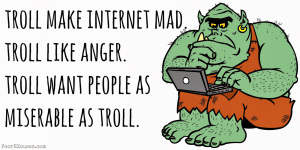Kate M. Colby's Blog, page 10
November 28, 2016
Indie Book Review: A Thousand Rooms by Helen Jones
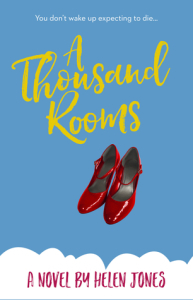 A Thousand Rooms by Helen Jones
A Thousand Rooms by Helen Jones
My rating: 5 of 5 stars
Katie didn’t wake up expecting to die. And yet, that’s exactly how A Thousand Rooms begins. As Katie stands on the street, watching emergency responders attend to her body, she waits for whatever comes next. Nothing comes, and Katie is forced to drift about the earth alone in search of her individual heaven, the meaning of her life, and any other souls who can help her.
I’ve long been a fan of Helen Jones’s Ambeth series, and I really enjoyed seeing her take on a different genre and world in A Thousand Rooms. The novel reads like contemporary fiction but has a lovely touch of fantasy and a good helping of romance (which came as a pleasant surprise after all of Katie’s struggles!). As usual, Jones’s writing is descriptive and detailed, and she beautifully brings to life the various settings (real and imagined) throughout the novel.
As a protagonist, Katie is a strong character. She has a deep love for her family, a clever set of problem-solving skills, and a bit of a potty mouth (which I really love, but some may find offensive). I appreciated how Katie remained headstrong and steadfast in her search for heaven, even after several obstacles sent her crashing (sometimes literally) back down to Earth. At times, she did get a little whiney for me … but hey, if I were dead and left to wander Earth alone, I know I’d bitch, too.
The novel has a steady pace, with a good balance of action and introspection. Personally, I would have liked to have seen a little less reflection on Katie’s life and more of the various heavens, but I understand why Jones chose to portion the novel as she did, and it works well. If I had to describe A Thousand Rooms in one word, it would be bittersweet. Katie’s emotions are raw and realistic, and as someone who deeply empathizes with others (and is a bit homesick herself), I found myself tearing up at several points throughout the novel. Sometimes, I grieved with Katie for her lost life, while at other times, I happy-cried for her moments of joy. Maybe I’m just a sucker … or maybe Jones has written a fantastic, emotionally resonant novel. (You can let me know after you read it!)
Overall, A Thousand Rooms is a beautiful journey that reminds the reader to appreciate every moment and focus on the “blessed” things in their life. While at times sad and introspective, it is also unfailingly hopeful and full of joy and love. Jones has crafted an endearing heroine, an uplifting love story, and a captivating vision of the afterlife (I wouldn’t mind if this novel were right!). Highly recommended for those who like strong female characters, coming-of-age narratives, and true love — just keep the tissues nearby!
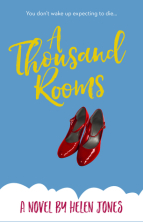 If you are interested in reading A Thousand Rooms and would like to help sponsor my writing and research, you can purchase it through my Amazon Associates Store. By doing this, you will not pay a cent extra, nor will the author receive a cent less, but I will receive a small commission on the sale. Simply click the book’s title or the book’s image.
If you are interested in reading A Thousand Rooms and would like to help sponsor my writing and research, you can purchase it through my Amazon Associates Store. By doing this, you will not pay a cent extra, nor will the author receive a cent less, but I will receive a small commission on the sale. Simply click the book’s title or the book’s image.
Filed under: Book Reviews Tagged: amreading, book, book review, books, contemporary, fantasy, fiction, heaven, inspirational, literary fiction, reading, romance, self-publishing








November 17, 2016
Writers: Judge Yourself by Your Own Standards
‘Comparisonitis’ is the most infectious disease in the writer community. Can you blame us? When John’s book has 100 five-star reviews and Jane has written six books this year and Joe has landed a major publishing deal, it’s difficult not to feel jealous and shame yourself for what you are/aren’t accomplishing.
Here’s your gentle reminder to CUT. IT. OUT.
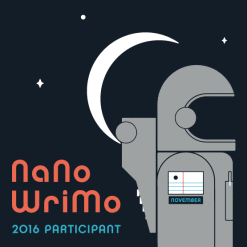 As I’m writing this post, we’re halfway through NaNoWriMo 2016. National Novel Writing Month (NaNoWriMo) is an online challenge where writers attempt to write 50,000 words in 30 days. Some writers meet this goal in 24 hours (seriously — here’s proof), while others struggle to write 1,000 words over the entire month. NaNoWriMo is a great way to kickstart your writing project and meet new writer friends … but it’s also a vehicle for self-doubt. As you watch your ‘Buddies’ word counts climb, it can spur you to work harder or make you feel like an utter failure.
As I’m writing this post, we’re halfway through NaNoWriMo 2016. National Novel Writing Month (NaNoWriMo) is an online challenge where writers attempt to write 50,000 words in 30 days. Some writers meet this goal in 24 hours (seriously — here’s proof), while others struggle to write 1,000 words over the entire month. NaNoWriMo is a great way to kickstart your writing project and meet new writer friends … but it’s also a vehicle for self-doubt. As you watch your ‘Buddies’ word counts climb, it can spur you to work harder or make you feel like an utter failure.
What you have to remember is that NaNoWriMo — like all writing — is not a competition. There are an infinite number of stories to be told and billions of readers to read them. The only person you should be worried about is yourself.
Take it from my experience. During my first NaNoWriMo, I went in with a plan, rocketed through the challenge, and wrote over 80,000 words that would become my first published novel, The Cogsmith’s Daughter (Desertera #1). This year, I was utterly unprepared for NaNoWriMo. I didn’t have time to write an outline before November 1, so I went into the challenge with everything but a plot. Literally. This is my third book in the Desertera series. I have characters, a world, a list of questions to answer, and a looming series finale … but I had no idea what should actually happen in this novel.
Regardless, I powered through the first ~11,000 words. By this point in the book, I realized the key story structure issues and could already imagine a better story arc. I had a choice to make. I could continue with NaNoWriMo (which is honestly the path I recommend, especially if you’re writing your first book and just need to finish something), or I could stop writing, craft the outline I should have started with, and rewrite.
Initially, I didn’t want to stop writing. I was embarrassed to watch my friends out-write me, and I felt obligated to keep pushing because I had publicly committed to the challenge. However, I had to remember, this isn’t just me anymore.
Though writing is my passion, I’m not writing ONLY for fun. I’m writing to build a catalog of books, to make writing my full-time career, and to please a small (but wonderful!) readership. Winning NaNoWriMo, while a great accomplishment, can’t be my goal if it sacrifices the quality of my book or yields 90,000 unusable words that will delay my production schedule. So, I chose to fail in the short term to succeed in the long term.
 Now, it’s your turn to look in the mirror. What are your goals for your writing? If you’re just writing for fun, do whatever you like! But if you’re writing for professional purposes, you might have to make some tough choices. Even if you’re also writing with hopes of creating a full-time career, your choices might not be the same as mine. That’s the beautiful thing about authorship: each writer, each book, each business is unique.
Now, it’s your turn to look in the mirror. What are your goals for your writing? If you’re just writing for fun, do whatever you like! But if you’re writing for professional purposes, you might have to make some tough choices. Even if you’re also writing with hopes of creating a full-time career, your choices might not be the same as mine. That’s the beautiful thing about authorship: each writer, each book, each business is unique.
As you come up against roadblocks or simply notice recurring patterns in your writing or business choices, ask yourself three questions:
How does this action further my writing goals?
Is there a better way to work toward these goals?
Do I feel satisfied and confident in this choice?
If the answers are unclear or nonexistent, it’s time to reevaluate. For me, pushing through NaNoWriMo would have yielded content, but it would have been poor content. By giving myself permission to plan and write my book properly, I will write a better rough draft, ease the publication process, and do what’s best for my business. Can you say the same about your writing choices?
*Note: this post is not an excuse to procrastinate or give up on your dreams. If you’re thinking of dropping out of NaNoWriMo or giving up on a draft just because it’s difficult work, you’re tired, etc., that’s not the same as making a small sacrifice in pursuit of a larger goal. Not sure? Let that nagging feeling in your gut be your good compass.
Has comparing yourself to other writers been a challenge for you? How do you evaluate whether a writing choice is best for you or you just ‘keeping up with the Rowlings’? Share your tips in the comments!
Filed under: Writing Craft & Tips Tagged: inspiration, motivation, NaNoWriMo, national novel writing month, outlining your story, writers block, writing, writing advice, writing tips








November 14, 2016
Indie Book Review: Dead Magic by Kara Jorgensen
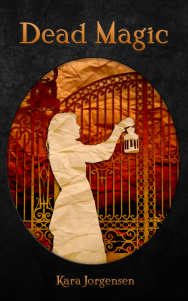 Dead Magic (IMD #4) by Kara Jorgensen
Dead Magic (IMD #4) by Kara Jorgensen
My rating: 5 of 5 stars
Dead Magic is the fourth novel in Kara Jorgensen’s Ingenious Mechanical Devices series. Since many of you may not have read the complete series, I will keep this review vague to avoid spoilers. If you would like to read my reviews of the other books in the series, I’ve included links to them at the bottom of this post.
Continuing the pattern established in previous books, Dead Magic leaves behind Eilian and Hadley Sorrell to once again focus on the lives of Immanuel Winter and Emmeline Jardine. Dead Magic marks the series’ grand entrance into the world of (you guessed it) magic. Though hints of magic have occurred throughout the other books, this novel dives deep into the rules of magic and its practitioners. Both Immanuel and Emmeline must learn to harness the magic within themselves as well as prevent a darker magic from consuming them… and the rest of London.
As always, Jorgensen’s characters are complex and well-crafted. Though I’d already spent much time with Immanuel and Emmeline in previous novels, Jorgensen still manages to reveal more about them through the obstacles they face in Dead Magic. It was deeply gratifying to see Immanuel start to heal and watch his relationship with Adam Fenice grow. Likewise, I appreciated that Emmeline remained her headstrong self, even when her stubbornness lead her astray.
Despite being separated by Immanuel and Emmeline’s perspectives, the plot of Dead Magic masterfully weaves together. The story contains a perfect balance of physical action, magical action, romance, and introspection. While I can’t say any of the events were huge surprises, the story held my interest from the start, and I enjoyed every page. With each novel, Jorgensen’s deft skill with words deepens. She has a great ability to write in a way that is both clear and lyrical.
Overall, Dead Magic is a wonderful addition to the Ingenious Mechanical Devices series. I feel like every time I read one of these novels, I pronounce the latest installation my favorite, but I have to do it again here — the series just keeps getting better and better! Highly recommended for readers who enjoy steampunk, Victorian era London, historical/dark fantasy and a dash of steamy romance.
Ingenious Mechanical Devices reviews: The Earl of Brass (IMD #1), The Winter Garden (IMD #2), The Earl and the Artificer (IMD #3)
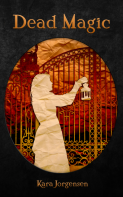 If you are interested in reading Dead Magic and would like to help sponsor my writing and research, you can purchase it at my Amazon Associates Store. By doing this, you will not pay a cent extra, nor will the author receive a cent less, but I will receive a small commission on the sale. Simply click the book’s title or the book’s image.
If you are interested in reading Dead Magic and would like to help sponsor my writing and research, you can purchase it at my Amazon Associates Store. By doing this, you will not pay a cent extra, nor will the author receive a cent less, but I will receive a small commission on the sale. Simply click the book’s title or the book’s image.
Filed under: Book Reviews Tagged: book review, books, dark fantasy, fiction, historical fiction, historical romance, indie book, indie book review, kara jorgensen, lgbt, magic, steampunk, victorian








November 4, 2016
Book Review: The Art of Breathing by Kate Evans
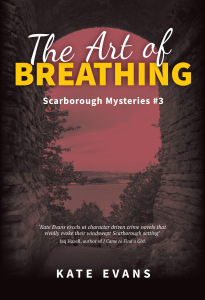 The Art of Breathing (Scarborough Mysteries #3) by Kate Evans
The Art of Breathing (Scarborough Mysteries #3) by Kate Evans
My rating: 5 of 5 stars
Disclaimer: I received a free electronic copy of this novel in exchange for an honest review.
The Art of Breathing by Kate Evans is a crime fiction novel and the third installment in the Scarborough Mysteries series. It follows the lives of Hannah Poole, Detective Sargent Theo Akande, and Aurora Harris as they navigate mental health and family issues, as well as investigate crimes in their small town. Because this is the third book in a series, I’ll keep some aspects of my review vague to avoid spoiling details from the first two novels. You can read my review of The Art of the Imperfect (Scarborough Mysteries #1) here.
When I read The Art of the Imperfect, I remember thinking that the novel read more like literary fiction (or even an extended prose poem) than a typical crime novel. While I enjoyed the gorgeous language, I found it difficult to keep track of the details at times. In The Art of Breathing, Evans has struck the perfect balance between poetic language and crime fiction. The novel includes the time-honored tropes of the crime genre, but the writing itself retains that beautiful, lilting character that sets Evans’s work apart. As someone who doesn’t always like the gritty/punchy feel of crime novels, Evans’ style is perfect for me.
Without spoiling anything, I’ll say that the plot is complete, intriguing, and comes with a few little twists (one of them is just … brilliant). However, even with a strong plot, I believe that the characters are the true jewel of The Art of Breathing. They are well-crafted and complex, and (as I’ll discuss below) serve as fantastic vehicles for Evans to explore important social themes. Where Evans’ character creation is particularly strong is their versatility – at times, they can be difficult to like (especially Hannah, with her self-destructive thoughts and behaviors), but they also elicit waves of empathy from the reader. A difficult task for a writer to accomplish.
In my own writing, I place a great deal of importance on examining social issues, so I really enjoy novels with strong thematic weight. The Art of Breathing, Evans manages to display both sides of several dark themes (sexual assault, adultery, murder, etc.) in a way that makes the reader question previously held assumptions. Her characters provide riveting case studies of mental health and social concerns (depression, PTSD, homophobia, racism, etc.), and after spending the novel with them, I truly felt like I came away with a better understanding of how people facing these issues live. That’s the power of great fiction – it deepens your perspective on reality and allows you to live other lives.
The Art of Breathing (and the rest of the Scarborough Mysteries series) isn’t your cookie-cutter crime fiction. It’s a study of human character, an examination of Western society, and a beautiful tribute to language … all wrapped up in a murder mystery. Strongly recommended for literary fiction readers who want a gentle entrance into crime fiction, and crime readers who are looking for a refreshing take on the genre.
Want to know more? Kate Evans was kind enough to drop by my website to describe how she uses her crime fiction to search for truth and delve into dark themes. You can read her insightful guest post here.
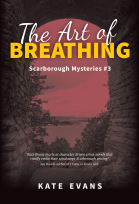 If you are interested in reading The Art of Breathing and would like to help sponsor my writing and research, you can purchase it through my Amazon Associates Store. By doing this, you will not pay a cent extra, nor will the author receive a cent less, but I will receive a small commission on the sale. Simply click the book’s title or the book’s image.
If you are interested in reading The Art of Breathing and would like to help sponsor my writing and research, you can purchase it through my Amazon Associates Store. By doing this, you will not pay a cent extra, nor will the author receive a cent less, but I will receive a small commission on the sale. Simply click the book’s title or the book’s image.
Filed under: Book Reviews Tagged: amreading, book, book review, books, crime, fiction, mystery, reading, self-publishing, thriller








November 3, 2016
Guest Post: Exploring Truth in Crime Fiction by Kate Evans
Today, I’m excited to welcome back crime fiction author Kate Evans. She’s talking about using her Scarborough Mysteries series as a vehicle to explore human truths, psychology, and mental health. Whether you’re a writer or a reader, this is a fascinating take on one author’s approach to fiction! Stay tuned tomorrow, when I’ll be reviewing Kate’s latest book, The Art of Breathing.
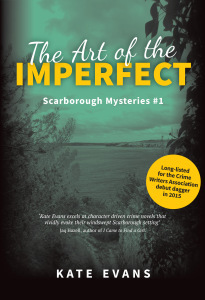 ‘What should the novel do: be a mirror to the reader’s world, reflecting it back at her, or be a clear pane of glass, not reflecting but offering something away from the self, a vista of a bigger, wider, different world outside? The moral energy of the novel form derives from its capacity to imagine the lives of others. This empathy can be seen as the beginning of the moral sense.’ Neel Mukherjee, shortlisted for 2014 Booker Prize.
‘What should the novel do: be a mirror to the reader’s world, reflecting it back at her, or be a clear pane of glass, not reflecting but offering something away from the self, a vista of a bigger, wider, different world outside? The moral energy of the novel form derives from its capacity to imagine the lives of others. This empathy can be seen as the beginning of the moral sense.’ Neel Mukherjee, shortlisted for 2014 Booker Prize.
Mirror or window, I enjoy novels which are either or both. I want my reading to make me think, make me ask questions, offer me perspectives on parts of the world I am unlikely to visit.
I write the kind of novel I would like to read, which means a novel which looks askance at the world we live in.
My own experience of depression and therapy and then my training as a psychotherapeutic counsellor led me to interrogate how we in the UK (and, perhaps, more widely in Western culture) perceive mental health. I am intrigued by discussions around why we talk about physical and mental health, why are the two separated? What we mean by good and bad mental health, what is the line, the distinction? About the idea of diagnosis, are we medicalising too much what are straightforward human responses?
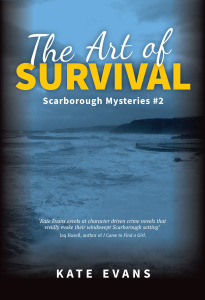 These kinds of questions underpin my three Scarborough Mysteries novels: The Art of the Imperfect (long-listed for the Crime Writers Association debut dagger); The Art of Survival; and The Art of Breathing. The series is set in Scarborough, the North Yorkshire coastal town where I live. The stories are told from the point of view of three characters: Hannah Poole; detective sergeant Theo Akande; and Aurora Harris. Hannah is training to be a counsellor, but her own rickety sense of self is sent into turmoil when her father dies and she begins to get back in touch with the memories of the childhood abuse she suffered. Theo is black and gay and a new-comer to Scarborough, trying to find his place on the town’s police force. Clever and kind, he undoubtedly has the most psychological equilibrium of the three story-tellers. Aurora Harris is neighbour and friend to Hannah; solicitor and new mum she struggles to balance these roles. Each book has a different crime which the three characters are drawn into, plus the emotional stories of Hannah, Theo and Aurora twist, interweave and develop.
These kinds of questions underpin my three Scarborough Mysteries novels: The Art of the Imperfect (long-listed for the Crime Writers Association debut dagger); The Art of Survival; and The Art of Breathing. The series is set in Scarborough, the North Yorkshire coastal town where I live. The stories are told from the point of view of three characters: Hannah Poole; detective sergeant Theo Akande; and Aurora Harris. Hannah is training to be a counsellor, but her own rickety sense of self is sent into turmoil when her father dies and she begins to get back in touch with the memories of the childhood abuse she suffered. Theo is black and gay and a new-comer to Scarborough, trying to find his place on the town’s police force. Clever and kind, he undoubtedly has the most psychological equilibrium of the three story-tellers. Aurora Harris is neighbour and friend to Hannah; solicitor and new mum she struggles to balance these roles. Each book has a different crime which the three characters are drawn into, plus the emotional stories of Hannah, Theo and Aurora twist, interweave and develop.
Through Hannah’s narrative, in particular, I hope to give the reader a taste of depression from the inside and also the experience of a possible route towards recovery. I know that several readers found Hannah ‘too hard to like’, missing, perhaps, the point that depression leads to a self-loathing which is unutterably distressing and all-encompassing.
The Scarborough Mysteries are a result of a thirty year long journey of writing and they didn’t find their genre – crime – until I made the decision to give my novel writing the time and space to come to fruition. So why crime? It was one of those weird writing experiences when I’d been tussling with the problem of structure and one day I woke up knowing that a crime novel would offer me the scaffolding within which to construct my story. Since I’ve always enjoyed reading a lot of crime novels, it was relatively easy for me to reacquaint myself with the crafting of one and the writing began to flow. It was a good decision. Having said this, the first in the series, The Art of the Imperfect, is less like a traditionally plotted crime novel than my third, The Art of Breathing, and I did a lot more planning for this most recent book with the usual shape of a crime novel in mind.
 It was only after taking my decision that I began to hear writers talking about crime as a genre for exploring the way our society is today. For instance, author Val McDermid has said that, of all the genres, crime is the best at tackling current issues. In a recent Artsnight (BBC2, 22nd July 2016), she explored what she described as the ‘complex relationship between truth and fiction.’ She said she had, ‘Walked the fine line between making things up and staying real.’ And, for her, ‘The very act of imagining has been a powerful way of accessing the truth.’
It was only after taking my decision that I began to hear writers talking about crime as a genre for exploring the way our society is today. For instance, author Val McDermid has said that, of all the genres, crime is the best at tackling current issues. In a recent Artsnight (BBC2, 22nd July 2016), she explored what she described as the ‘complex relationship between truth and fiction.’ She said she had, ‘Walked the fine line between making things up and staying real.’ And, for her, ‘The very act of imagining has been a powerful way of accessing the truth.’
In addition, I want my novels to go against what I see as a wrong-headed trend in modern day crime writing, the propensity to label the perpetrator of the crime, usually murder, as a psychopath. For me this is too easy. It also has the tendency to mark out the murderer as ‘other’, it’s too cosy, for me, for the reader to think, ‘I am not a psychopath and so I would never do anything as awful as this.’
In my stories I want to explore what measures very ordinary people might take – out of fear, jealousy, hate, love – and how it might all go horribly wrong. I do believe most people who commit crime, particularly abuse and murder, are able to justify their actions to themselves, and I am very interested in those justifications. I do think we have many potentials within us and if we ignore what may be lingering in what Carl Jung called our ‘shadow’ we do so at our peril. Firstly because we are not fully aware of all of ourselves. Secondly, we might unknowingly act from our shadow which could have disastrous consequences for ourselves and others.
In the UK, around a quarter of the population live with emotional or psychological vulnerabilities. I hope they may recognise some truth in my novels. And, maybe, those who are around them may gain an increased understanding of what mental health and resilience means.
 Author Biography
Author Biography
Kate Evans is a writer of fiction, non-fiction and poetry. Her non-fiction articles have been published in (among other publications) The Guardian, The Independent, Counselling Today, Poetry News, The Journal for Applied Arts in Health and The Journal of Poetry Therapy. Her book Pathways Through Writing Blocks in the Academic Environment was published by Sense Publishers in April 2013. She has created two word-based installations for the arts festival Coastival, one inspired by the works and life of Edith Sitwell. She has an MA in Creative Writing from Sussex University and teaches on the Degree in Creative Writing at the University of Hull, Scarborough campus. She is trained as a psychotherapeutic counsellor.
In October 2016 she will be appearing at the Beverley Literature Festival. The Art of Breathing will be launched in WH Smiths in Scarborough on the 29th October 2016.
Connect with Kate Evans
Email: kateevans@tinyonline.co.uk
Website: www.scarboroughmysteries.com
Twitter: @KateEvansAuthor
Facebook: https://www.facebook.com/kate.evans.author
The Art of the Imperfect: https://goo.gl/JrGat2
The Art of Survival: https://goo.gl/6RPzk5
The Art of Breathing: http://amzn.to/2fbu1g7
Filed under: Guest Posts, Musings & Bookish Things, Writing Craft & Tips Tagged: books, crime fiction, fiction writing, guest post, kate evans, literary themes, mental health, psychology, scarborough mysteries, writing tips








November 1, 2016
Month-End Update: October 2016
With a productive October behind me, I can feel the wintry winds of November nipping at my heels. Despite how much I accomplished in October, I don’t really have much to say about it. The month revolved around finishing up my nonfiction prompts series, which I did, with the writing and publication of 100 Horror Writing Prompts (Fiction Ideas Vol. 10). I also had a great reading month and blazed through quite a few titles on my to-be-read list.
As November begins, I feel like a race horse prancing at the starting gate. It’s NaNoWriMo season, and for some reason, I’ve decided I have time to take on the challenge. I’m out of excuses, and I will finally (with much anxiety and cautious excitement) be returning to the world of fiction with Desertera #3. Wish me luck – and feel free to add me as a writing buddy @KateMColby!
Writing & Editing
Blog Posts Written – 7 and one guest post
Fiction Words Written – 0
# of Days I Wrote Fiction – 0
Nonfiction Prompts Written – 100 prompts (plus work on the prompts anthology)
# of Days I Wrote Nonfiction – 20
Drafts Revised – Proofread of 100 Horror Writing Prompts
# of Days I Revised – 1
Outlines Written – 1 (upcoming prompts anthology)
Days Without Creation/Production – 11
Reading
Books Finished
Curiosity and the Hounds of Arawn (Gabrielle #2) by Zachary Paul Chopchinski
Maledicus: The Investigative Paranormal Society Book I by Charles F. French
Productivity for Creative People by Mark McGuinness
Buffy the Vampire Slayer: Season 9, Volume 2 by Andrew Chambliss
Angel: Season 9, Volume 2 by Christos Gage
The Art of Breathing (Scarborough Mysteries Book 3) by Kate Evans
Books Begun/In-Progress
From Hell by Alan Moore
Books Reviewed on Blog
Maledicus: The Investigative Paranormal Society Book I by Charles F. French – read review
*Remember, I review every book I read on my Goodreads page.
Author Business Activities
Wrote and published 100 Horror Writing Prompts (Fiction Ideas Vol. 10)
Reading and reviewing novels for other authors
General administrative tasks (newsletter updates, shipping paperbacks, etc.)
Goals for November
Participate in and “win” NaNoWriMo 2016
Finish and decide on publication date of the prompts anthology
(Beta-)read and review books on TBR list
What did you accomplish in October? What goals are you working towards in November? What is your NaNoWriMo project? Share below!
Filed under: Writing Updates Tagged: Author Business, blogging, book launch, Book Reviews, books, creative writing prompts, goals, horror, independent publishing, indie author, NaNoWriMo, nanowrimo 2016, nonfiction, self-publishing, writing








October 28, 2016
The Final Booklet: 100 Horror Writing Prompts
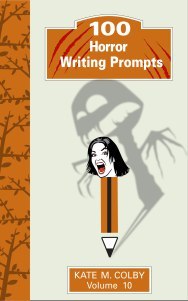 Well, that’s all she wrote. For now, anyway.
Well, that’s all she wrote. For now, anyway.
I’ve published my final creative writing prompts booklet: 100 Horror Writing Prompts (Fiction Ideas Vol. 10). Writing these booklets has been an incredibly fun and inspiring challenge. Not only have I learned more about these 10 fiction genres, I’ve also pushed myself creatively and have been deeply humbled by all those writers who I’ve helped along the way.
If you’re looking for a little spooky inspiration for the season (or the upcoming NaNoWriMo), grab a copy on Amazon. It’s FREE through Halloween (October 31).
You can read the full description below. Happy writing!
Do you want to write a bone-chilling horror story? This booklet contains 100 writing prompts to help spark your inspiration.
Do you feel that novel burning inside you but are unsure where to begin?
Are you an established horror author looking for a fresh new idea?
If you’re ready to stop staring at the blank page and start writing NOW, 100 Horror Writing Prompts is the booklet for you. There’s no fluff and no wasted words – just 100 fiction prompts to get you back to what you do best: writing.
100 Horror Writing Prompts is packed with character- and story-focused prompts to jumpstart your fiction writing. Each prompt has been carefully designed to address the motifs of horror fiction – from terrifying creatures to spooky haunted houses to bloody death scenes.
Inside, you’ll find prompts on the following subgenres:
1. Creepy Kids
2. Dark Fantasy
3. Dark Mystery
4. Fabulist
5. Hauntings
6. Monsters
7. Occult
8. Psychological Horror
9. Quiet Horror
10. Splatter
Each section contains 10 thought-provoking prompts. Practice them in order, or dive right into to what inspires you most. You’ve already wasted enough energy on writer’s block. It’s time to get started on your next great horror story.
Make your readers afraid of the dark. Buy 100 Horror Writing Prompts today.
Filed under: Kate's Nonfiction for Writers Tagged: amwriting, booklet, creative writing, free kindle, free on amazon, horror, inspiration, writing prompts, writing tips








October 25, 2016
How to Handle Book Reviews: Good, Bad, and Ugly
 Book reviews are the lifeblood of books. A healthy rating encourages potential readers to buy, makes an author eligible for merchandising from retail sites, and improves a book’s overall ranking on those sites. However, if enough readers read your book, eventually you’re going to get a bad review (probably several). Those dreaded one-star ratings are the cost of exposure.
Book reviews are the lifeblood of books. A healthy rating encourages potential readers to buy, makes an author eligible for merchandising from retail sites, and improves a book’s overall ranking on those sites. However, if enough readers read your book, eventually you’re going to get a bad review (probably several). Those dreaded one-star ratings are the cost of exposure.
After hearing a few author horror stories on the subject of reviews, I wanted to provide a public service announcement of sorts. Sure, several other authors have written on this topic already, but just in case mine is the first you read (or you want another opinion), here is my advice for how to handle your book reviews: good, bad, or ugly.
First, it is important to remember that you are not your book. Reviews are a subjective reaction to your creative work and not you as a person. (We’ll get to the 1% in which this is not the case in a bit.)
Personally, I try not to read reviews (good, bad, or ugly). This is not to say that I don’t try to cultivate them, or that I do not appreciate them (Seriously, if you’ve reviewed one of my books, thank you!). However, I know myself. A bad review can temporarily shatter my confidence and ruin a whole writing day. That’s not worth it to me, my work, or my readers.
My solution? I have my husband check my reviews for me (once a week or so). If there’s a good review, he lets me know. If there’s a bad review, he distills it down to only the constructive criticism (and leaves out any rudeness), so that I can learn from the review, without being upset by it.
You have to decide what’s best for you. If you’re a sensitive soul like me, try getting a spouse, friend, or family member to be your review buffer. If you’re a tough cookie, read all you want. As long as reviews don’t over-inflate or deflate your ego, there’s nothing wrong with reading them.
So, that’s my general policy. Now let’s drill down into the specifics. For the purpose of this article, “good” reviews refers to positive reviews, “bad” reviews refers to critical reviews, and “ugly” reviews refers to hateful or personal reviews.
Good Reviews
Good reviews tell you two things: what readers like about your book and who likes your book. When you get a good review, take note of the reader’s praise and try to keep those themes in your writing. Also, do a little research on your reader. What other books have they liked or disliked? From their profile, do they fit within your target audience? These will tell you if your book is reaching the right market and give you an idea of where to advertise or how to promote your book in the future.
When I published my first novel, I checked my reviews often and responded to the positive ones (That’s all there is when only your friends and family are reading your book!) with a ‘like’ or comment on Goodreads. Now, I don’t respond to any positive reviews. It’s not that I don’t appreciate them (Again, I totally do — thank you!). It’s that A) I don’t want to offend anyone by accidentally skipping or not commenting on their review, B) it sets a precedent that I might also respond to neutral or bad reviews, and C) I really don’t have that kind of time. Note to my readers: if you want to have an actual dialogue about my books or receive a personal thanks, just shoot me an email via the contact page.
It’s worth noting that I have never responded to any reviews on Amazon or another online retailer. As a social network, Goodreads muddles the line, but on retail sites it is clear: do not respond to reviews. It’s unprofessional and the retail sites are likely to frown on it.
Bad Reviews
We all know these. They’re the ones that make us want to crawl under the covers or throw the laptop out of the window and never write again. But bad reviews can be good. Beyond providing you with constructive feedback, they tell other readers what this person did or didn’t like about your book, so that they can better judge for themselves. Your target audience can be persuaded by bad reviews (Is it full of cursing? Sounds up my alley!), and your non-ideal audience will be warded off (Sex? No way!), thus preventing another bad review in the future.
It is my policy to never respond to bad reviews. First off, I respect the reader’s right to their own opinion. Second, they’ve already “wasted” enough time with my book, they don’t need me saying anything to them.
Some authors make exceptions for this. For example, some will jump to defend a concept the reader clearly missed that could change their perspective of the book. Others will respond if a reader makes a factual error in the review. My professional opinion is to stay silent. Most times, you will only irritate the reader more, or never receive a response to your rebuttal anyway.
Here are a few other ways to react to bad reviews:
Remember, you are not your book. The conception of bad writing (or actual bad writing — let’s be honest, it happens) do not make you a bad person or unworthy creator. It just means you have more to learn. We all do.
Take comfort in that even the best books have bad reviews. This may come as a shock, but there are people out there who hate Harry Potter. I know, but it’s true. Go to the page of your favorite author and check out some of their book’s most scathing reviews. If they can survive it and have their work admired, so can you.
Go read some of your five-star reviews. Or social media comments or emails or whatever. Focus on the readers who get and love your work. They’re the ones that really matter.
Really need to respond to that disgruntled reader? Write a response and destroy it. Do this by hand so there is no temptation or possibility of posting it online. Craft your elegant defense or your childish slew of insults, then rip it up and throw it out. You’ll feel better without doing any damage to your professional image or online relationships. Venting to a trusted friend — NOT in online writers’ groups or forums — is another idea. Seriously, though, don’t put your gripes online. A) It can be found by readers. B) It still makes you look bad. C) Negativity will just bring other writers down. Don’t be that person.
If all else fails, I like to get existential. You are only certain of this one life. Is one person’s dislike going to keep you from pursuing your passion? I didn’t think so.
Ugly Reviews
These are reviews that make personal attacks on your character, threaten you, or which are given to your book because the reviewer has a personal vendetta against you. Luckily, these are super-rare, but they can happen. Again, I strongly encourage you not to respond. Instead, contact the website administrator and ask for the review to be removed. If the review is not about the book or makes explicit insults or threats, this should not be a problem. It cannot prevent the reviewer from repeating the attack from a different account, but it is the safest and most responsible course of action.
No matter what praise or criticism, your books receive, remember that you are not your books. Their success or failure does not reflect your character or personality. While writing ability is very personal, it can be improved over time with patience and practice. Whether in book review responses (don’t do it!) or anywhere else online, always be respectful and courteous to readers. And most importantly, never let anyone else keep you from writing.
How do you handle the different types of reviews? What are your best practices for authors? Share your advice in the comments.
Filed under: Author Business & Publishing Tagged: author, Book Reviews, five-star reviews, how to handle reviews, independent author, independent publishing, indie books, one-star reviews, self-publishing, writer life



 [image error]
[image error]



October 18, 2016
My First Anniversary as an Author-Entrepreneur
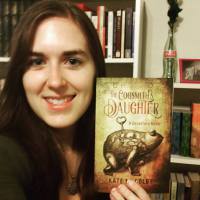
Holding my book for the first time!
Although I wrote my first novel, The Cogsmith’s Daughter (Desertera #1), nearly two years ago, this month marks the anniversary of its publication and what I consider to be my first year as a published author and entrepreneur. Is the writing life everything I thought it would be? Yes and no.
Before choosing independent publishing, I did extensive research into the field. I knew that one book (or two, or ten) is not enough to make a full-time living as an author. I held no illusions about being a break-out success or breaking even on my initial investment in one year (Across industries, small businesses take an average of five years to earn a profit.). While some authors reach these milestones within the first year, and while I have tallied many of my own proud accomplishments, short-term success has never featured in my goals. I’m lucky enough to be in a position where I can build my author career slowly. Currently, I’m 24 and a half years old. I want to be a full-time author on my 30th birthday. I think that is realistic and obtainable.
At this point, my career as an author-entrepreneur must be my second financial priority. With my husband in graduate school, I am the primary breadwinner for our family, and my day job must come first. In order to continue publishing books, I make sacrifices and set aside a budget for publishing expenses. Sometimes I miss those little luxuries (like binge-watching Netflix all Saturday, or dyeing my hair every three months), but the short-term sacrifices are worth the long-term gain. If I’ve learned anything from being an author-entrepreneur, it’s how to think days, months, and years into the future simultaneously.

Chai tea = writing fuel
When I first declared myself an author and established Boxthorn Press, I focused heavily on blogging and bringing together a supportive community of writers and readers. I cannot recommend this highly enough. Through writing and reading blogs, I’ve made some of my best friends, as well as many valuable business connections. I still want to provide helpful posts and engaging content for my fellow writers and readers, though I’m starting to realize that my blog needs to take a backseat to creation. Over time, my posting schedule has declined from five days a week to three to two, and I think this has been a healthy shift for my productivity.
Perhaps the most difficult experience I’ve had as a writer is dealing with criticism. I know my books aren’t perfect. On the fiction front, I have a long way to go as a storyteller (If I didn’t, that wouldn’t make for a very fun career!), and I’ll be the first to admit that my nonfiction booklets have been crafted on a shoestring budget. I know everyone will not like, understand, or appreciate my art, and negative attention is the price of exposure. Bad reviews and hurtful comments only strengthen my own self-doubt and internal editor, but luckily, I have the perfect antidote …
You. My readers and writing friends who are reading this right now. If you had told me one year ago the amount of support and encouragement and caring I would receive from the outside world, I would have laughed. But it’s entirely true. My readership is small but mighty. Those who enjoy my novels (and booklets) have shown an outpouring of support in reviews, social media shout-outs, and yes, monetary support. Without all of you, I would have a damn difficult time blocking out those negative voices and zero chance of achieving my dream of full-time authorship within the next five and a half years. So, from the bottom of my heart, thank you.
Without spoiling my 2017 New Year’s Resolutions, I want to wrap up this post by addressing my goals for the future. My creative mentor (from afar, that is), Joanna Penn, talks about measuring your life in Olympic periods (and writes an inspiring reflection post each year). If you judge your progress by one year, it may not seem like a lot has happened. However, over the course of four years, so much more can change.

Finishing my second book (aka the first is not a fluke!).
From late 2016 to late 2017, I want to focus on creation and diversification. I’ll put out a new book (hopefully two!) in the Desertera series, but I’d also like to expand the novels I have into audiobooks and perhaps foreign translations. At the same time, I’d like to start planning and writing my second series in the background, so that it is ready to publish when it is time to wrap up Desertera. With my nonfiction, I hope to begin a full-length book and perhaps diversify the products I already have.
Over the next Olympic period? I’d like to have two complete fiction series under my belt and available in all English formats (ebook, paperback, and audiobook) and perhaps another language or two in ebook format. I would also like to have two or three full-length nonfiction books, so that other writers can learn from my mistakes and accomplishments. I’d also like to expand my author-entrepreneurship into other avenues, such as course creation, author services, or perhaps something more social like podcasting. Hopefully, Boxthorn Press will be making a profit and heading to a place in which it can replace my day job.
You know what the craziest part is? I don’t think this is all a pipe dream. I’ve researched the industry, studied successful indies, and have picked apart my every strength and weakness. While success is not fully in my power (I’m still beholden to my readers, after all.), I hold 90% of the cards. If I keep learning and working, I know I can make my dream a reality.
Two years ago, I started scribbling down an outline in a notebook and praying that I could achieve my biggest dream of writing a novel. One year ago, I hit the publish button and achieved my new biggest dream of becoming a published author. Today, I’m telling you that I want to achieve my newest biggest dream of being a full-time author by age 30.
Can I do it? Well, stick with me and let’s find out together.
Filed under: Author Business & Publishing Tagged: author, boxthorn press, career, dreams, entrepreneur, full-time author, goals, inspiration, kate m colby, reflection, writing








October 14, 2016
Indie Book Review: Maledicus (The Investigative Paranormal Society Book I)
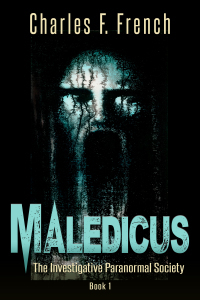 Maledicus: The Investigative Paranormal Society Book I by Charles F. French is a horror novel that mixes elements of paranormal suspense with historical fiction. In the relatively sleepy town of Bethberg, Pennsylvania, the Investigative Paranormal Society (IPS) team (Roosevelt, Sam, and Jeremy) search out strange happenings, then debunk them or dispel disgruntled spirits, as appropriate.
Maledicus: The Investigative Paranormal Society Book I by Charles F. French is a horror novel that mixes elements of paranormal suspense with historical fiction. In the relatively sleepy town of Bethberg, Pennsylvania, the Investigative Paranormal Society (IPS) team (Roosevelt, Sam, and Jeremy) search out strange happenings, then debunk them or dispel disgruntled spirits, as appropriate.
In the series’ debut novel, the IPS faces off against its toughest opponent yet: a demon named Maledicus. Once a proud (and depraved) Roman citizen, Maledicus now delights in bringing terror to the living. When Maledicus targets a young girl and her aunt, the IPS must stop him before he can devour their souls.
Before I dive into my review, I want to add two quick disclaimers. First, as always, I’ll be keeping the content details vague to avoid any spoilers. Second, I’m inclined to note that I received an advance copy of this novel. Therefore, it might have gone through further revision before publication (thus rendering some of my comments moot).
One of my most important concerns for paranormal novels is whether the story follows “the rules of its world.” Maledicus does exactly that. The paranormal content is believable within the story and “the rules” remain consistent throughout. French uses vivid language to bring the paranormal activity and demon Maledicus to life, which makes the scary moments all the more chilling for the reader. Without spoiling anything, the plot follows a clear trajectory, contains a great balance of action and quiet suspense, and reaches a satisfying conclusion.
Though the plot itself remains rather linear, the narrative structure of Maledicus jumps back and forth between different times, locations, and character perspectives. At first, I found this a bit odd to read. Like many classic novels, the narrative often reads more like the author is telling a story, rather than the reader is in the moment with the characters. However, once I adjusted to this style, it did flow rather well.
French offers the readers chapter flashbacks into the human life of the demon Maledicus (which makes him all the more despicable), as well as mini flashbacks within scenes that feature the IPS team. These are clearly given to add depth to the characters and succeed in that goal. However, personally, I would have preferred for the scenes featuring the IPS team members to stay in the present day, with hints at backstory peppered throughout. Of course, this might have just been my impatience to see if/how the evil Maledicus would be defeated!
As for the characters themselves, I found them to be well-rounded and distinct personalities. In particular, appreciated that they are mostly middle-aged to elderly, as I believe literature needs more diverse/fewer stereotypical representations of “older” characters. Roosevelt is the classic gentlemen, while Sam feels every bit the ex-cop (and jokester), and Jeremy perfectly fits his role as the more introverted one of the group. The main side characters are equally well-developed and compelling – I especially liked Helen’s passion for learning, dedication to her family/students, and unwavering bravery.
My only criticisms with the characters are that sometimes the dialogue came off a bit stiff and that I felt they were over-described. Many physical and emotional details were repeated multiple times, and while that is always a writing no-no, it was superfluous with such distinct characters.
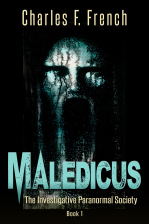 Overall, I enjoyed reading Maledicus: The Investigative Paranormal Society Book I. Horror in plot, paranormal/historical in details, and literary in narrative style, it’s a well-crafted debut novel with compelling characters and a nice balance of action and quiet suspense. Recommended for readers who like ghost stories, history, and cozy mystery.
Overall, I enjoyed reading Maledicus: The Investigative Paranormal Society Book I. Horror in plot, paranormal/historical in details, and literary in narrative style, it’s a well-crafted debut novel with compelling characters and a nice balance of action and quiet suspense. Recommended for readers who like ghost stories, history, and cozy mystery.
Charles F. French was kind enough to contribute a guest post to accompany my review, where he discusses the theme of evil in Maledicus. Check it out here. If you’d like to read Maledicus, pick up your copy from Amazon.
Filed under: Book Reviews Tagged: book review, bookworm, charles f french, demons, evil, fiction, history, horror, indie book, maledicus, paranormal, reading, suspense











